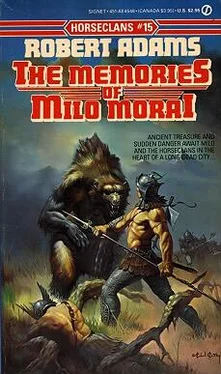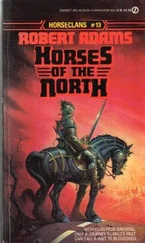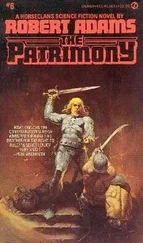Then, on the seventh morning since the second departure of Mehrdok and Rehnee, big, beefy Djeen Nohbuhl brought a lathered riding horse to a rearing halt before the armory, jumped off the beast and stalked purposefully toward the door, shouting ahead of himself.
“Who the hell’s gonna be the next one for to disappear, Daiv?You? Where in tarnation is that old goat Mosix, anyhow? It ain’t no drop of water in none of the ditches. I just come by the creek from my place and itdon’t look like one damn bucket’s been raised since at least yestiddy. You s’pose to be taking the cap’n’s place, man! What you gonna do ’bout it, huh?”
The redfaced farmer shut up long enough to apply his mouth to the full mug of beer Daiv shoved at him, and while the newcomer was noisily drinking the cool liquid, Djahnstuhn asked, “Did you ride by his place, Djeen? Maybe the old bastard’s sick. I know he didn’t come to get no meat last time, but we run out anyway, you know, so I just didn’t pay him not coming no mind, really.
“I tell you, Djeen, you stay here and have you another quart of beer, see, and I’ll take your mare and ride over to Mosix’s. If he’s sick or hurt of somethin’, ought to be somebodygot to look after him and some-body else got to work down at the creek till Mosix can do it again, too.”
Nohbuhl, whose fondness for beer was well known, needed no further urging. Long before Daiv had walked across to the panting mare, he heard the wail of the trapdoor’s squeaky hinges and he knew that he dare not take long about this affair, or Djeen would be too drunk to mount and ride back to his farm.
Daiv was not a cruel man, however, and despite his urgency, he kept the nearly spent mare to a slow walk the length of the journey. Long before he reached the complex of ancient brick-and-concrete buildings, he could hear the loud braying of Mosix’s ass gelding and, as he neared, the blattings of the old man’s two milk goats.
Thereason for the animal’s complaints were apparent when he had dismounted and sought them out. Shaking his head in disgust at such mistreatment of livestock, he led the ass out of the stinking, dung-littered stall, opened the gate of the small paddock and urged the ass into it. Next, he drew enough buckets of water up from the well to fill the trough and forked a goodly amount of hay over the fence to the hungry, thirsty ass. More hay went into the goat pen and several more buckets of well water into the smaller trough, but he knew that this would not be enough to assuage the discomforts of the two big nannies. Their udders were hugely distended, both needed to be milked, but there was no milking pan to be seen and Daiv’s inborn frugality could not countenance wastage of the goat milk, not under any circumstances.
Observing the proprieties, Daiv walked around to the front of the dwelling and, after scraping his soles on the edge of a slab of wood placed there for the purpose, mounted to the low, roofed stoop. As he approached the front door, a large brownish tomcat jumped from off a railing and, uttering contrabasso purrs, began to rub against his leg, looking up at him from a scar-seamed face.
But there was no answer to his repeated knockings, and the door was immovable, locked and barred, from the feel of it. So, now trailed by the tomcat, he walked back around to the door closest to the stableyard. That one, too, was locked, however, and the windows were all tightly shuttered. For a moment, Daiv could only stand and swear in frustration.
Then, suddenly, he snapped his calloused fingers, smiled and set off around the complex to the high, wide, two-valved door which led into the sometime council chamber and library. Opening one of the doors, then the other for light, he wormed his way between the high stacks of sacked grain to the other end of the long, lofty room. As he reached the interior door that was his objective, he noted a ferret crouching beside a bare wooden platter. The half-tame creature stared at him briefly with beady eyes, then scuttled back among the stacks of grain sacks.
The door let into a short corridor at the end of which was another door. Immediately Daiv opened that second door, his nose told him exactly what he was going to find within the priests’ house. There was no mistaking the stink of overripe flesh.
The body, swollen and hideously discolored with rampant corruption, lay on the floor between the dining table and the hearth. Gagging at the close, fetid stench that filled the room, Daiv afforded the corpse of the onetime high priest but the briefest of glances before striding to the front door, unbarring and unlocking it, then flinging it wide open, followed by both windows.
From the place it had resumed upon the front stoop, the brown tomcat strolled into the room and, after sniffing cursorily at the body of its deceased servant, hopped up onto the dining table and began to nibble at a half-emptied bowl of hard, stale, crusted porridge, heedless of the skittering roaches whose feastings he had disturbed.
Hating to do it, Daiv put Nohbuhl’s mare to a stiff trot all the way back to the armory, thinking that he would have to send the man to the closest farm to the armory—the Gibsuhn place—to fetch back some men and boys to get Mosix underground as soon as possible; the shape the days-old cadaver was in now, Daiv would not have even considered having the women wash it and clothe it properly; the thing would likely burst or come to pieces under their ministrations anyway.
But by the time he reached the armory, Djeen Nohbuhl was roaring drunk, swilling down a mixture of winter cider and beer, all the while bellowing out what he probably thought was a song and beating time on a tabletop with the work-hardened palm of one broad hand.
Poor Daiv did not know what to do. Were he to try using Djeen’s mare again today, he would run a severe risk of foundering her. Then, announcing their arrival with exuberant whoops, the hunt came riding in, their pack animals heavy-laden with two big stags and what looked to be at least twenty rabbits.
The hunters were proud of themselves and had every right to be so, and Daiv was quick to afford their prizes at least a brief examination accompanied with words of praise, before getting down to business.
“Herb, old Mosix has done died, two, mebbe, three days ago in his house. Won’t be no proper fun’ral, ’cause he’s rotten, stinking, in there. You ride out to Gibsuhn’s and tell him I said to bring along his two biggest boys and a pickaxe and a couple of shovels, too. Tell him he’ll get Mosix’s ass for the trouble, but that them two goats is already spoke for.
“Sam, you and your brother get to skinning and butchering, hear? Gabe, you ride out to Nohbuhl’s place and tell his wife she better send in a wagon for old Djeen in there—his mare is plumb spent and he’s too drunk to get on her anyhow.”
Sam Cassidy dismounted, hitched his horse and walked back to begin offloading the kills from the pack animals, but his brother, Shawn, sat his horse in silence for a moment before speaking to Daiv.
“With just only the two of us, men’ Sam, doing it all, it’s bound to take us till dark or after, and I got reasons I gotta git back to our place sooner’n that,” he stated.
Daiv felt his anger rising, but he held it in check for the nonce, asking, “Shawn, if Captain Mehrdok had done told you what I just done told you, would you’ve told him what you just done told me?”
Shawn squirmed in his saddle and would not meet Daiv’s stare. “Well . . . but you ain’t the captain, neither.”
“No,” Daiv agreed readily, “I ain’t the captain, not even the first sergeant, but I am a sergeant, which is more rank than you or your brother got, and I’m the man—Sergeant Daiv Djahnstuhn—that our captain said was to run things here till he and First Sergeant Rehnee got back. You heared that, we all of us did. Right?”
Читать дальше












